The Roof of the World: A Tibetan AAR
- Thread starter Eärendil
- Start date
-
We have updated our Community Code of Conduct. Please read through the new rules for the forum that are an integral part of Paradox Interactive’s User Agreement.
You are using an out of date browser. It may not display this or other websites correctly.
You should upgrade or use an alternative browser.
You should upgrade or use an alternative browser.
Nice AAR you have so far! Tibet's an absurdly ambitious choice, so a solid start...
As for your latest move- surely that has to count as an exploit of some kind ? Ah well, you picked a country that relies upon yaks for survival- I think we can forgive you that!
? Ah well, you picked a country that relies upon yaks for survival- I think we can forgive you that!
As for your latest move- surely that has to count as an exploit of some kind
Chapter 7

With Chinese war indemnities, Tibet gained at the first of every month about ten years worth of total Tibetan income at their current budget.
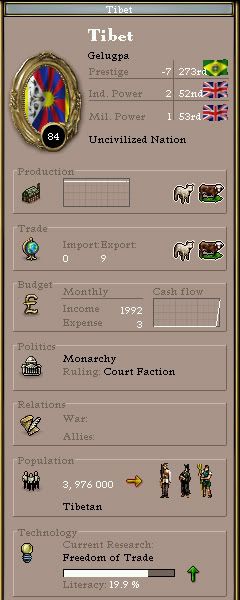
Shortly after the war, Dalai Lama started what was generally known as the great call of conversation; where he ordered all free Tibetans to give up their day jobs and start devoting their lives to Tibetan Buddhism. The Tibetan peasants thought at first that it was an act of lunacy, but did not complain as they did not have to work to survive any longer, for Chinese money filled their pockets and Chinese workers fed their stomachs.
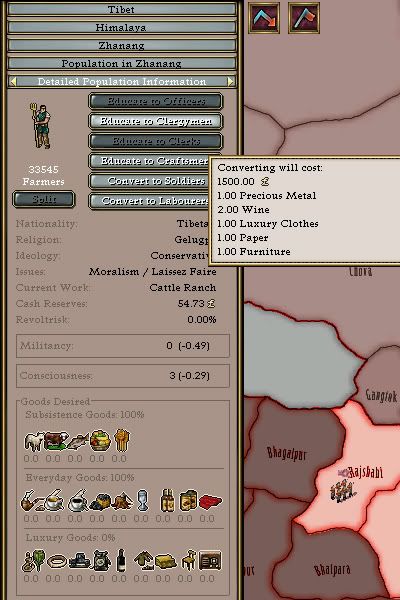
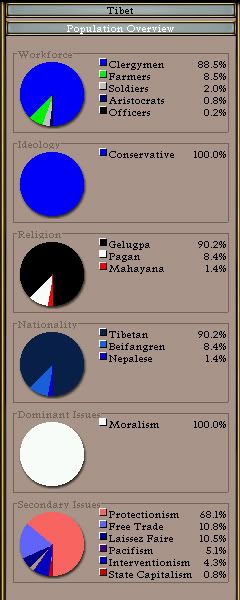
On September 3, 1851, 88.5% of the Tibetan population had started dedicating their lives to Buddhism. With this you have to keep in mind that only 90.2% of the population was of Tibetan nationality, because only a very small number of Tibetans were allowed to continue their lives as soldiers, officers or aristocrats. The Chinese and Nepalese were the only ones who were allowed to continue to work as shepherds and farmers.
Now that the majority of the population no longer had to focus on doing laborious work, many decided to dedicate themselves to researching and inventing new things. Our research rate increased by a huge margin!

Freedom of Trade was quickly finished and focus was laid on researching Market Structure.
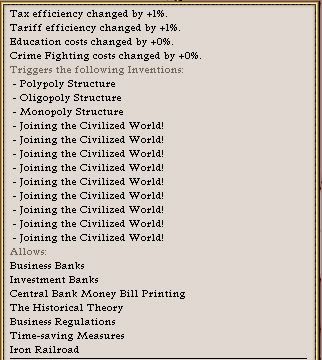
On January 3, 1851, our first regular Infantry unit was formed when many young farmers around the country were drafted into a single division, 10,000 men strong.
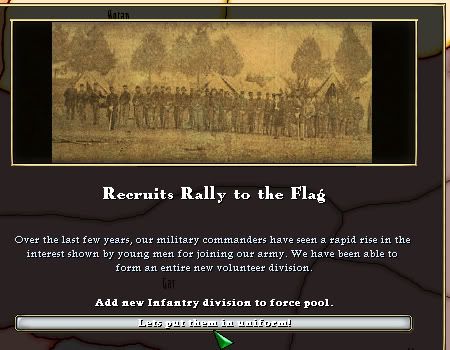
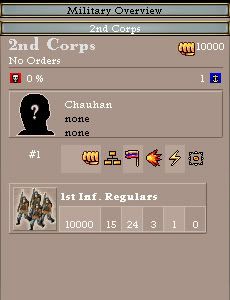
On April 4, 1852, two things of general interest occurred. Our scientists had finished their progress on Market Structure, and secondly, British India had gone to war against Burma. Dalai Lama did not like that British India once again showed no respect for the native Asian nations and in his mind many ideas of how he would stop their reign of terror came up, some more realistic than others.
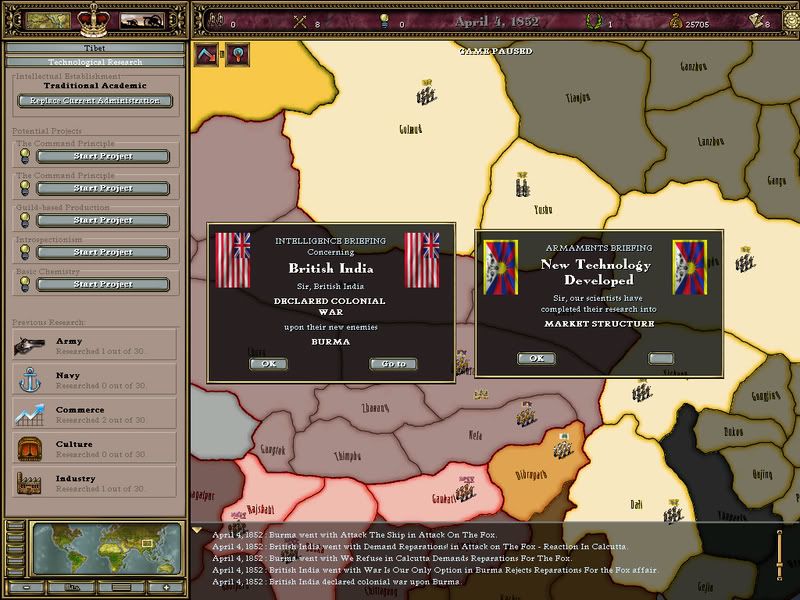
With the military in his mind, Dalai Lama decided to go for The Command Principle as for the next tech.
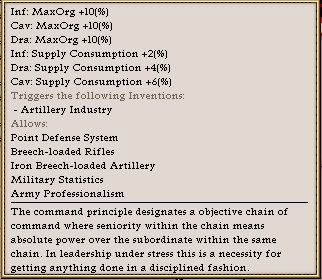
Will we see Dalai Lama go to war again? Find out in the next chapter.

With Chinese war indemnities, Tibet gained at the first of every month about ten years worth of total Tibetan income at their current budget.

Shortly after the war, Dalai Lama started what was generally known as the great call of conversation; where he ordered all free Tibetans to give up their day jobs and start devoting their lives to Tibetan Buddhism. The Tibetan peasants thought at first that it was an act of lunacy, but did not complain as they did not have to work to survive any longer, for Chinese money filled their pockets and Chinese workers fed their stomachs.


On September 3, 1851, 88.5% of the Tibetan population had started dedicating their lives to Buddhism. With this you have to keep in mind that only 90.2% of the population was of Tibetan nationality, because only a very small number of Tibetans were allowed to continue their lives as soldiers, officers or aristocrats. The Chinese and Nepalese were the only ones who were allowed to continue to work as shepherds and farmers.
Now that the majority of the population no longer had to focus on doing laborious work, many decided to dedicate themselves to researching and inventing new things. Our research rate increased by a huge margin!

Freedom of Trade was quickly finished and focus was laid on researching Market Structure.

On January 3, 1851, our first regular Infantry unit was formed when many young farmers around the country were drafted into a single division, 10,000 men strong.


On April 4, 1852, two things of general interest occurred. Our scientists had finished their progress on Market Structure, and secondly, British India had gone to war against Burma. Dalai Lama did not like that British India once again showed no respect for the native Asian nations and in his mind many ideas of how he would stop their reign of terror came up, some more realistic than others.

With the military in his mind, Dalai Lama decided to go for The Command Principle as for the next tech.

Will we see Dalai Lama go to war again? Find out in the next chapter.
With Chinese war indemnities, we currently have more money than we can spend and as a result I converted 98% of the Tibetans to clergymen in order to max out research point generation. I was lucky to receive yet another regular military unit although a second one isn't as vital towards quick civilizing as the first one. Surely, I got a good unit, but the 1 military score I saved could easily have been covered with Chinese war indemnities. In the test games I did before I seemed to average one regular unit per game. In this one, I have been lucky to get two already.
I think one of the best features in VIP:R is the new civilizing requirements. Before it made no sense that a nation needed 25 military score to civilize, and it meant playing uncivs pretty pointless. With the new requirements, it's great fun trying to civilize one of the uncivs that doesn't have civilizing events.
Tibet still have some neighbours that are possible targets for expansion. Can you guess which one is next in line?
I'm glad you have confidence in me.
The feature sometimes makes sense and sometimes not. If for example, Prussia was in war against say Denmark and Sweden, surely occupying Stockholm would've been a blow to the Danes and a +20% warscore would've been justified. In my case I guess it could be considered an exploit as Xinjiang is much weaker than China. In a perfected game the bonus in warscore should IMO be related to the relative strength between the allies.
In this AAR I think I came up with a good story to "cover up" the exploit though .
.
Raden Shaka, Ahura Mazda, Freddan, likk9922 & stnylan: Thank you very much for your comments!
BurningEGO said:Thats cheap.
Oh and thanks for posting them - i for one didnt imagine the requirements would be diferent with VIP.
I think one of the best features in VIP:R is the new civilizing requirements. Before it made no sense that a nation needed 25 military score to civilize, and it meant playing uncivs pretty pointless. With the new requirements, it's great fun trying to civilize one of the uncivs that doesn't have civilizing events.
Dirked99 said:Nice move with striking the Chinese, however is there anyway to gain more territory out of your next few wars? Money can get you very far, but you need a stable base get gain more.
Tibet still have some neighbours that are possible targets for expansion. Can you guess which one is next in line?
Vladislav said:First I thought you had gone crazy, then I thought you were cheating, but now I see that the war and subsequent peace with China was actually a very clever gambit on your part.
I'm glad you have confidence in me.
DerKaiser said:Nice AAR you have so far! Tibet's an absurdly ambitious choice, so a solid start...
As for your latest move- surely that has to count as an exploit of some kind ? Ah well, you picked a country that relies upon yaks for survival- I think we can forgive you that!
The feature sometimes makes sense and sometimes not. If for example, Prussia was in war against say Denmark and Sweden, surely occupying Stockholm would've been a blow to the Danes and a +20% warscore would've been justified. In my case I guess it could be considered an exploit as Xinjiang is much weaker than China. In a perfected game the bonus in warscore should IMO be related to the relative strength between the allies.
In this AAR I think I came up with a good story to "cover up" the exploit though
Raden Shaka, Ahura Mazda, Freddan, likk9922 & stnylan: Thank you very much for your comments!
Make sure to use effective use of the yaks. You can make coats, fat oil, and have meat! And you can ride them. I say you develop Yak Assault Vehicles. And destroy the world.
Hmmm. Arent clergyman some kind of dead end for promotion? If so, you might get troubles later.
If I recall correctly, you can demote clergymen as long as your government doesn't have a moralist policy... which I think is what he has. :S I guess he could switch to a liberal party since the government is a monarchy.
Dirked99 said:And you can ride them. I say you develop Yak Assault Vehicles. And destroy the world.
London, here we come!
Woah, thats a helluva lot of money you got there. It'll be interesting to see what you'll create with 'em. 
Chapter 8

The war between British India and Burma was over in just about two months and the Burmese forces were completely taken by the superior British technology and numbers. On June 15, 1852, a peace treaty was signed between Burma and British India, with Burma seceding its entire coastline.
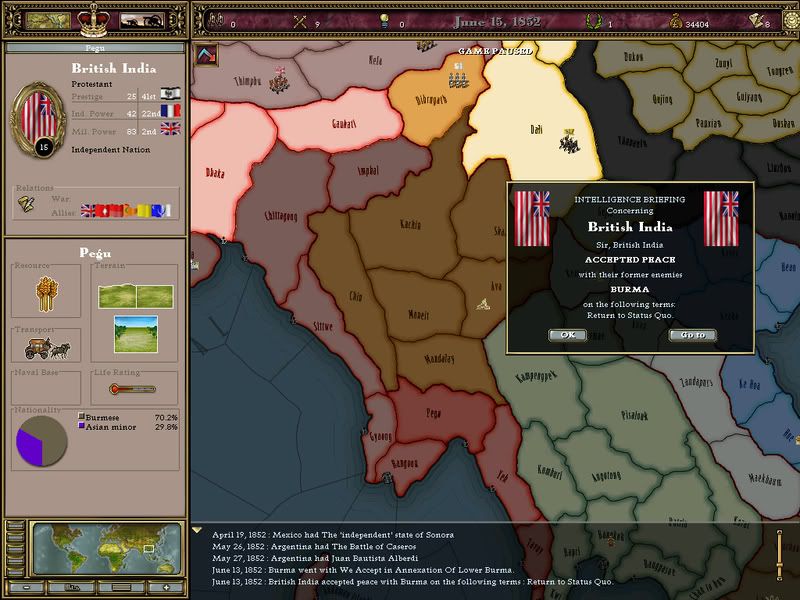
Burma was left in disarray and Dalai Lama sought to capitalize on it. Immediately after the peace treaty between British India and Burma was signed, Dalai Lama sent a formal request for the Burmese king to pledge allegiance to Dalai Lama and join him in his quest to stop colonialism in the area. When the Burmese king refused, Dalai Lama responded with a declaration of war.
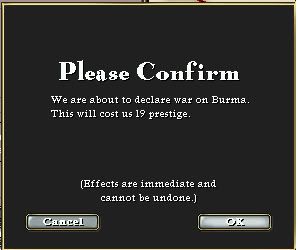
Dalai Lama ordered his newly formed infantry unit together with the cavalry unit from the previous war to cross the border and invade Burmese territory. The survivors of the 1,900 irregulars were left to defend Lhasa.
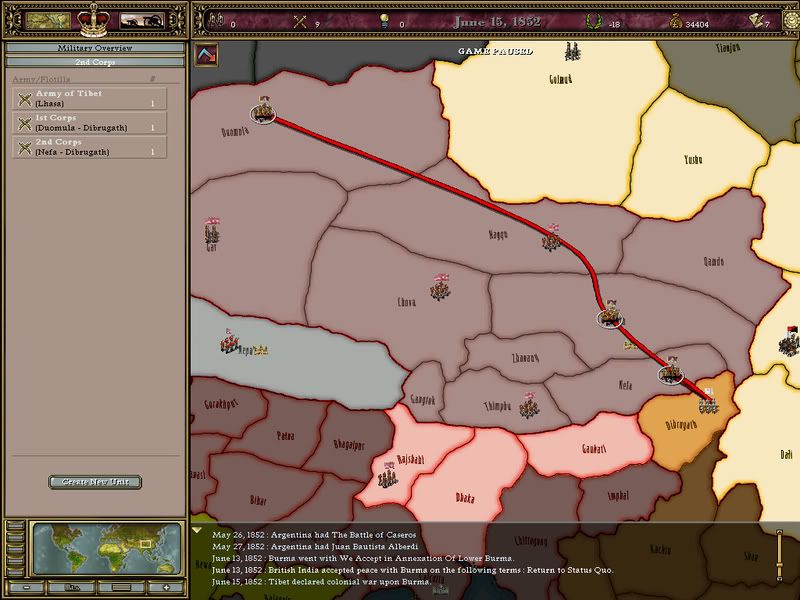
On July 3, 1852, the infantry reaches Dibrugath and seems remnants of a Burmese army fleeing the province in disorder. The Tibetan army however does not attempt to engage the Burmese and instead waits for the cavalry to arrive and starts occupying the province.
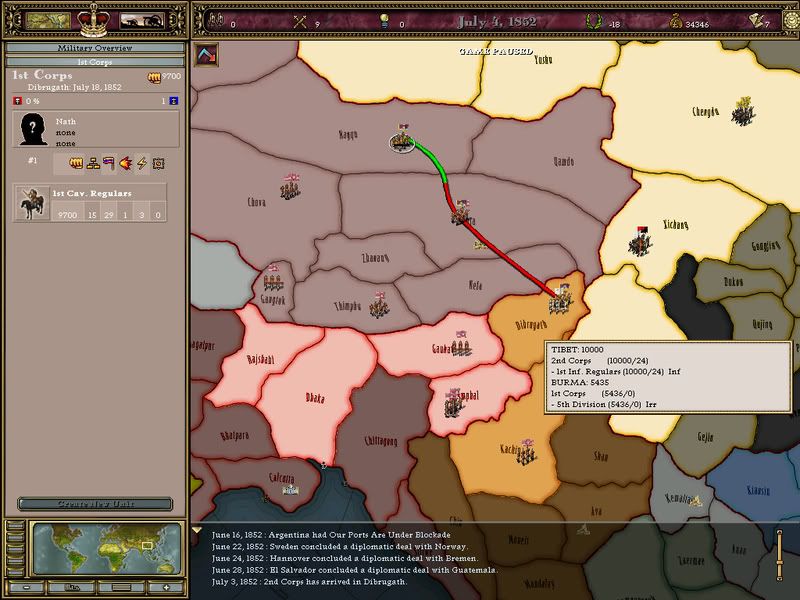
On October 13, Dibrugath is liberated and the combined forces move on to engage the 6,800 men strong Burmese army guarding Kachin.
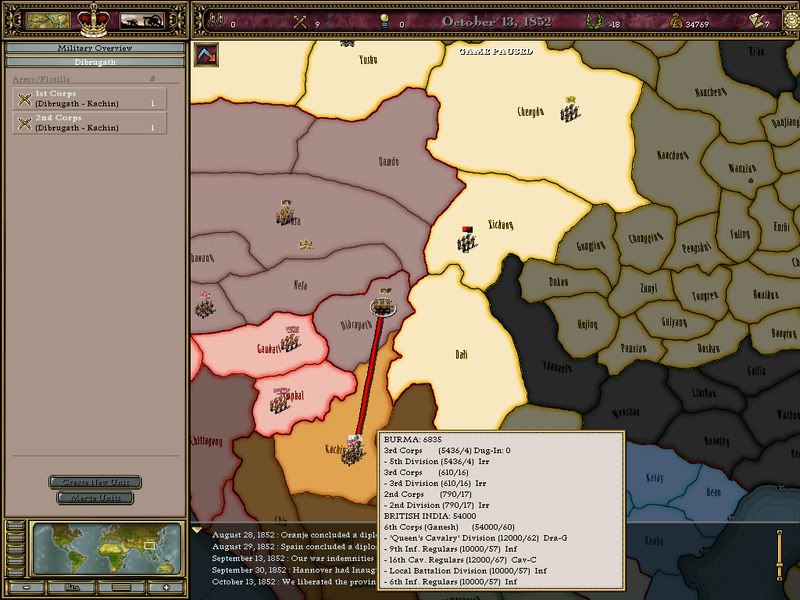
The Burmese forces were very disorganized and it just took the cavalry three days to make them flee the battleground despite only slightly outnumbering them. The infantry had not even arrived yet.
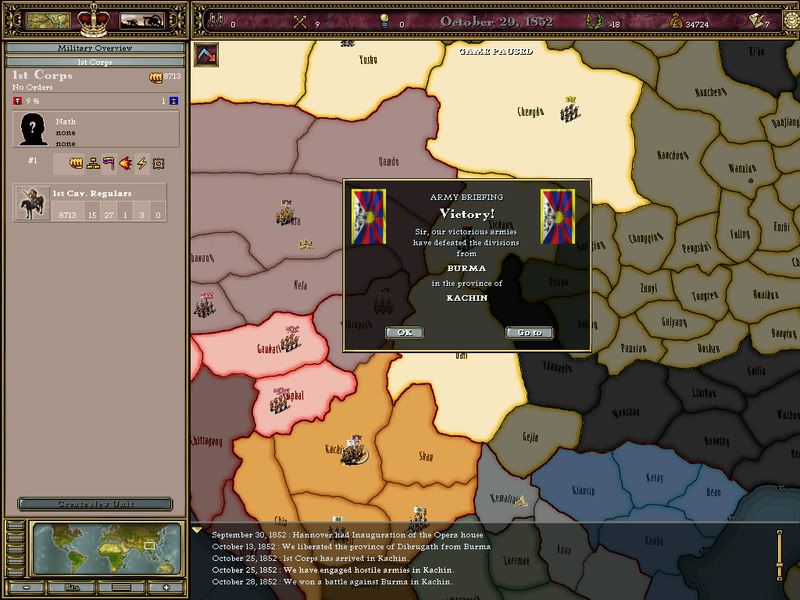
Burma sent two attempts to defeat the Tibetan forces occupying Kachin but both were repulsed with ease.
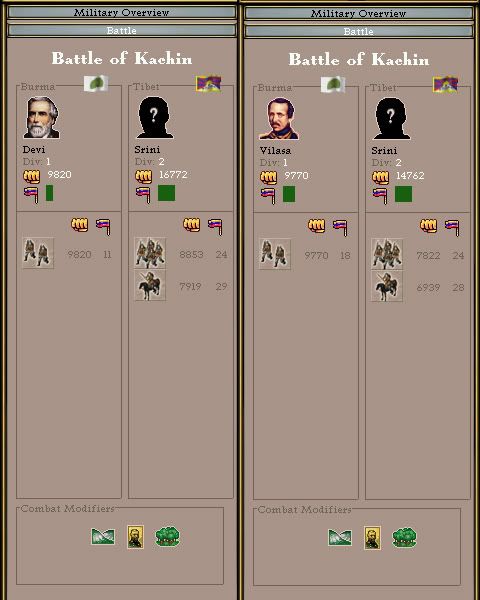
The first attempt under General Devi was repulsed in six days of fighting, while the second one under General Vilasa was over in just five days.
On March 11, Kachin was finally liberated but at the same time in the south, Tibetan scouts reported movement among several Burmese divisions, numbering tens of thousands of men. The Tibetan generals had not anticipated seeing the Burmese army so strong after the war against British India but nonetheless they set out to head for Shan, the northeastern province in Burma, as Dalai Lama had set a specific goal to liberate the province.
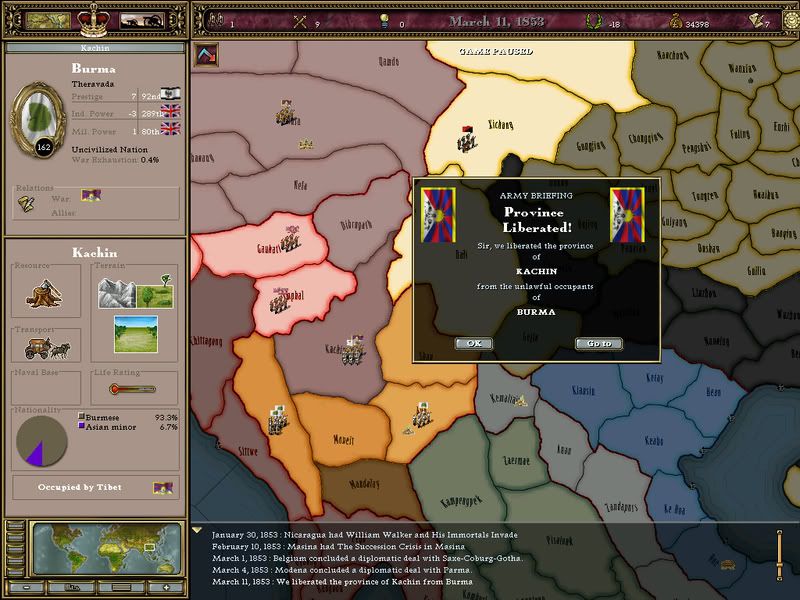
The Tibetan forces met no resistance in Shan and on August 25, the province was liberated.
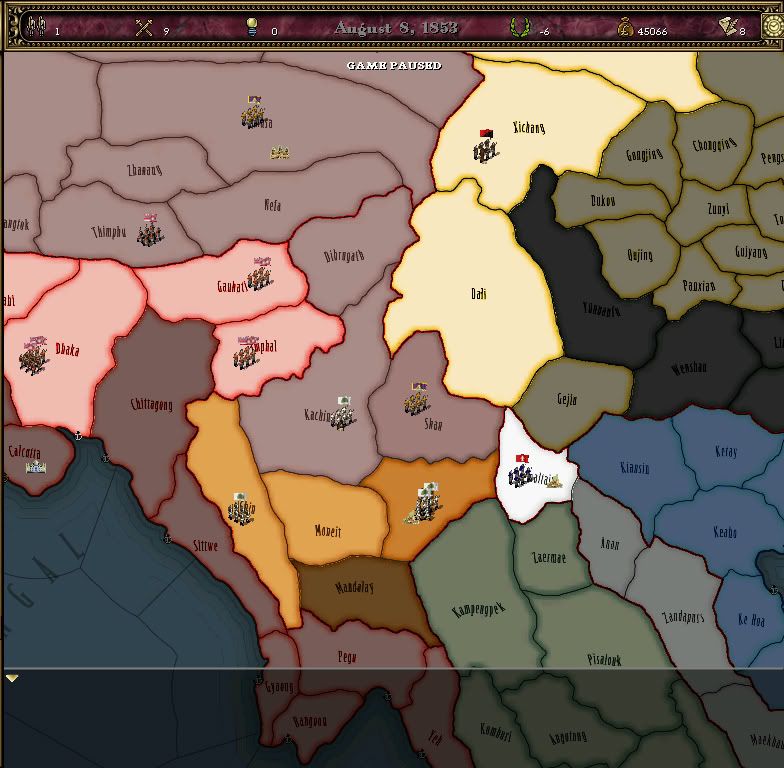
However, scouts reported that a Burmese army was seen in Kachin, trying to liberate the province from Tibetan control. This left the Tibetan army at a crossroad; should they move on to try to take the Burmese capital in Ava, risking a possible encirclement and getting cut off from supplies, or should they move back to secure Kachin once again? The Tibetan generals knew that a liberation of the capital meant a guaranteed victory but however, would they be able to defeat the Burmese army there despite being outnumbered two to one?

The war between British India and Burma was over in just about two months and the Burmese forces were completely taken by the superior British technology and numbers. On June 15, 1852, a peace treaty was signed between Burma and British India, with Burma seceding its entire coastline.

Burma was left in disarray and Dalai Lama sought to capitalize on it. Immediately after the peace treaty between British India and Burma was signed, Dalai Lama sent a formal request for the Burmese king to pledge allegiance to Dalai Lama and join him in his quest to stop colonialism in the area. When the Burmese king refused, Dalai Lama responded with a declaration of war.

Dalai Lama ordered his newly formed infantry unit together with the cavalry unit from the previous war to cross the border and invade Burmese territory. The survivors of the 1,900 irregulars were left to defend Lhasa.

On July 3, 1852, the infantry reaches Dibrugath and seems remnants of a Burmese army fleeing the province in disorder. The Tibetan army however does not attempt to engage the Burmese and instead waits for the cavalry to arrive and starts occupying the province.

On October 13, Dibrugath is liberated and the combined forces move on to engage the 6,800 men strong Burmese army guarding Kachin.

The Burmese forces were very disorganized and it just took the cavalry three days to make them flee the battleground despite only slightly outnumbering them. The infantry had not even arrived yet.

Burma sent two attempts to defeat the Tibetan forces occupying Kachin but both were repulsed with ease.

The first attempt under General Devi was repulsed in six days of fighting, while the second one under General Vilasa was over in just five days.
On March 11, Kachin was finally liberated but at the same time in the south, Tibetan scouts reported movement among several Burmese divisions, numbering tens of thousands of men. The Tibetan generals had not anticipated seeing the Burmese army so strong after the war against British India but nonetheless they set out to head for Shan, the northeastern province in Burma, as Dalai Lama had set a specific goal to liberate the province.

The Tibetan forces met no resistance in Shan and on August 25, the province was liberated.

However, scouts reported that a Burmese army was seen in Kachin, trying to liberate the province from Tibetan control. This left the Tibetan army at a crossroad; should they move on to try to take the Burmese capital in Ava, risking a possible encirclement and getting cut off from supplies, or should they move back to secure Kachin once again? The Tibetan generals knew that a liberation of the capital meant a guaranteed victory but however, would they be able to defeat the Burmese army there despite being outnumbered two to one?
The Burmese-British Indian war is a scripted war with a scripted peace event firing once Burma has been overrun by British Indian troops (I have not seen otherwise). It did indeed surprise me that the Burmese army was still so strong after the war, as most likely none of their divisions got destroyed. None of the battles I won in the update were won because they were forced to retreat of low morale either, as only the divison you can see in the first screenshot had zero or really low morale. The battles won is short time was the AI deciding to retreat. This war will prove to be a lot harder than I thought it was going to be.
:rofl: But don't you think it would be unfair to the Tibetans to destroy the world once they've actually managed to have little success?
Yes, I have. Although, only the cavalry event have been vital to quick success as I've now managed to speed up my research rate to about .60 research points per month.
Heh, it's funny that you mention it now...
Everything stated above is correct. Thanks for reading and commenting.
Well, at the moment it is a little far-fetched, but we will see what happens as time passes.
Well, I'm afraid that with such a backwards nation as Tibet you can do suprisingly little, but we shall see what happens .
.
Thanks to everyone who has read and commented!
Dirked99 said:Make sure to use effective use of the yaks. You can make coats, fat oil, and have meat! And you can ride them. I say you develop Yak Assault Vehicles. And destroy the world.
:rofl: But don't you think it would be unfair to the Tibetans to destroy the world once they've actually managed to have little success?
stnylan said:You have had some good fortunate with the events.
Yes, I have. Although, only the cavalry event have been vital to quick success as I've now managed to speed up my research rate to about .60 research points per month.
Herbert West said:Hmmm. Arent clergyman some kind of dead end for promotion? If so, you might get troubles later.
Heh, it's funny that you mention it now...
Vladislav said:If I recall correctly, you can demote clergymen as long as your government doesn't have a moralist policy... which I think is what he has. :S I guess he could switch to a liberal party since the government is a monarchy.
Everything stated above is correct. Thanks for reading and commenting.
Ahura Mazda said:London, here we come!
Well, at the moment it is a little far-fetched, but we will see what happens as time passes.
Freddan said:Woah, thats a helluva lot of money you got there. It'll be interesting to see what you'll create with 'em.
Well, I'm afraid that with such a backwards nation as Tibet you can do suprisingly little, but we shall see what happens
Thanks to everyone who has read and commented!
Once again a great update, I guess it would be smart to secure Kachin once again but that won't knock 'em out of the war. I'm eager to see how you'll handle the situation. 
Hmm, you shouldve converted more POPs to soldiers, methinks. I say settle for whatever you can get asap because it looks like they have a much larger army than you.
I gotta say this is an amazing game! The grand strategy you bring to such a tricky country like Tibet is incredible! I didnt understand the point of your Chinese campaign until right as it ended, its truly a great AAR. I cant imagine what will happen next, but I really loved seeing all of Tibet become clergymen!
Ah, just as I thought... The Dalai Lama is taking advantage of the EIC-Burma war, and decided to take the wounded tiger into submission.  Now, take the capital and make them recognize the Dalai Lama as their overlord! Don't forget to take Dibrugath as your own province, though...
Now, take the capital and make them recognize the Dalai Lama as their overlord! Don't forget to take Dibrugath as your own province, though...
Are you planning on creating a 'South Central Asian Commonwealth' to isolate the EIC? Making Afghanistan and Kalat your sattelites might pull you a diplomatic victory. 'The Bear' on the north might also be interested if you're planning to defy India.
Are you planning on creating a 'South Central Asian Commonwealth' to isolate the EIC? Making Afghanistan and Kalat your sattelites might pull you a diplomatic victory. 'The Bear' on the north might also be interested if you're planning to defy India.
I've been lurking here since you started this AAR. Decided it was about time I posted to say how much I'm enjoying reading this.
Good luck with the future of Tibet. I hope you bring enlightenment to the world.
Good luck with the future of Tibet. I hope you bring enlightenment to the world.


